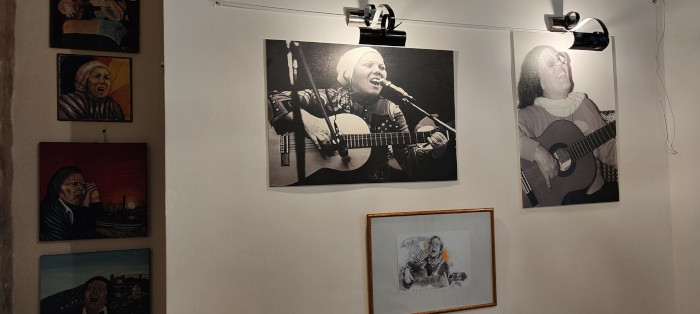If there’s been a woman in the vast Italian cultural landscape capable of narrating her own land, namely Sicilianity, with incredible strength of spirit, tempered by a difficult life, doubts vanish instantly: it is Rosa Balistreri, the first Italian woman ballad singer.
Indeed, Rosa Balistreri managed to express Sicilianity like few others, with her extraordinary musical talent, accompanied by a voice that “screamed” indignation towards crimes and abuses, such as those she endured. It was thanks to her voice, fueled by great courage, that she managed to determine her own destiny, freeing herself from a dramatic and violent life.
Rosa Balistreri was born in Licata (in the province of Agrigento) on March 21, 1927, into a very poor family: her mother was a humble housewife, and the only source of income came from the small woodworking jobs her father did.
From a very young age, Rosa Balistreri had a strong and original vocal timbre that allowed her, later on, to interpret Sicilian folk songs with a deeply dramatic tone.

Despite this talent, which might have promised her a more glorious destiny from the start, Rosa Balistreri’s youth was disturbed by an unpleasant event.
At just 16 years old, young Rosa was forced into a arranged marriage with Gioacchino Torregrossa, a decidedly unsavory man, given to gambling and alcohol abuse.
Many years later, during a concert, Rosa would describe that man as “latru, jucaturi e ‘mbriacuni,” meaning “thief, gambler, and drunkard” in Sicilian dialect.
The stormy events that Rosa Balistreri endured with Gioacchino Torregrossa, also known as “Iachinazzu,” reached their peak after the man lost his daughter Angela’s dowry to gambling. This incident enraged Rosa, leading to an unexpected reaction.
Rosa, now desperate due to her husband’s behavior, attacked him, inflicting a wound with a file, believing she had killed him, and immediately went to surrender to the carabinieri.
Gioacchino Torregrossa survived, but this didn’t prevent Rosa Balistreri from serving 6 months in prison, later released on probation.
To support her daughter, Rosa took on various jobs: first in a glassworks, then as a seller of snails, capers, prickly pears, and sardines, and finally she worked for a noble family in Palermo; she later sent her daughter to boarding school. During this time, Rosa learned to read and write.
Having fallen in love with her employer’s son, Rosa became pregnant; she was then forced to flee and subsequently received a six-month prison sentence for theft from the family she worked for.
After leaving prison, she found work as a sacristan and caretaker at the Church of the Agonizing in Palermo, where she lived in a basement with her brother Vincenzo, who was disabled and learned to be a cobbler during that time.

Rosa Balistreri’s life seemed to maintain that nightmare atmosphere from her youth, as a new twist seemed to confirm: she received harassment from the new priest, to which she did not yield. However, this refusal forced her to flee from a society that had become very hostile to her.
In her new escape, Rosa, after stealing money from the alms boxes, left with her brother Vincenzo for Florence, where he later worked in a shoemaker’s shop and she worked in noble households.
Their mother and one of Rosa’s sisters were later called to Florence, and together they started a fruit and vegetable stall at the San Lorenzo market.
The sister Maria would later join them, fleeing with her children from her husband’s abuse; but shortly after the escape, her ex-husband killed her; following this tragedy, Rosa’s father took his own life by hanging himself.

In the early 1960s, Rosa met the Florentine painter Manfredi Lombardi, with whom she lived for 12 years.
During this period, she expanded her circle of friends, coming into contact with the intellectuals of the time.
In 1966, she participated in a show of popular songs staged by Dario Fo, titled “Ci ragiono e canto.”
Rosa, then 40 years old, had a face marked by a life as harsh as it was intense, with clear and confident eyes of someone who fights their battles to the end; her voice had an ancient and direct timbre: her dramatic presence remained vivid in the minds of spectators, just like the Sicilian folk songs she interpreted, which narrated not only poverty but also the pride and indignation of the people.
For about twenty years, she lived in Florence before moving to Palermo in 1971.
After being left by Manfredi Lombardi for a model, Rosa, to support herself and her daughter, who had left boarding school for love and was expecting a child, acted in the Teatro Stabile di Catania.
In 1973, Rosa Balistreri decided to participate in the Sanremo Festival with her song titled “Terra che non senti,” but the song was excluded at the last minute because it was deemed not original; this episode caused quite a stir to the point that the Sicilian singer was considered by many as the true winner of that year’s Festival.
In 1974, she participated along with other folk artists in Canzonissima. From 1976, she was often accompanied by Mario Modestini, a musician and composer, who wrote the music for her voice in “La ballata del sale” (1979), “Buela” (1982), and “Ohi Bambulè” (1987).
Rosa Balistreri died at the age of 63 on September 20, 1990, in Palermo, at Villa Sofia Hospital following a stroke that occurred during a tour in Calabria; she was later buried in the cemetery of Trespiano (a suburb of Florence).
On May 31, 2008, the concert “Terra ca nun senti” (taken from the homonymous song which means “Earth that you don’t feel” in Sicilian dialect) was organized as a tribute for the Etnafest edition of 2008, held in Piazza Università in Catania, with the participation of various artists: Rita Botto, Carmen Consoli, Giorgia, Patrizia Laquidara, Nada, Marina Rei, Etta Scollo, Tosca, Paola Turci, Ornella Vanoni, Alfio Antico, Faraualla, Emma Dante, with the Etna Orchestra conducted by Salvo Cantone.

In 2017, the documentary film “Rosa Balistreri – un film senza autore” by Marta La Licata, directed by Fedora Sasso, was produced and broadcast on the Rai Storia channel as part of the series “Italiani,” a monograph dedicated to the singer with the publication of some unpublished works and the testimonials and tributes of intellectuals who collaborated with her, including Andrea Camilleri, Leo Gullotta, Otello Profazio, and Gianni Belfiore.
In November 2012, Nicolò La Perna published the volume “Rosa Balistreri – Rusidda… a licatisi,” a work that collects the life and works of Rosa Balistreri, with the precious testimonies of people who knew her or who had the immense fortune to work with her, still remembered today for her beautiful voice, authentic, just like her life, hard, and difficult, which shaped a great soul capable of transforming pain into music.
The still vivid memory of Rosa Balistreri in a House-Museum named after her
On March 21st, the birthday of Rosa Balistreri, a House-Museum titled “La Casa di Rosa” was inaugurated in Licata: an initiative that not only dutifully honors the memory of the Sicilian singer-songwriter but also aims to promote cultural activities, especially targeting youth and schools.
The cultural workshop “La Casa di Rosa” was born from a project initiated by the Center for Sicilian and Mediterranean Culture Studies, which, with the collaboration of artists and cultural figures, strives to preserve and revalue the priceless treasures of Southern Italy as the center of the Mediterranean.

In that small and humble house, located in the historic center of Licata, where Rosa Balistreri spent her childhood and began to sing with her splendid voice, there is now the operational headquarters of the Center for Sicilian and Southern Culture Studies, from which a series of cultural and artistic promotion events and projects will be launched.
The conception and realization of Casa di Rosa were made possible also thanks to the folk singer Mel Vizzi and Dr. Nicolò La Perna, the biographer of Rosa Balistreri and president of the Center for Sicilian and Mediterranean Culture Studies, who played a fundamental role.
Numerous sympathizers and admirers paid tribute to the memory of Rosa Balistreri; furthermore, folk singers and musicians from all over Sicily and even from northern Italy performed, all united in remembering the singer from Licata, whose memory fortunately still remains alive, to tell, once again and with the hope of continuing to do so, the beauty and pain of her land: Sicily, two conflicting aspects that coexist, just like in the hard and difficult life of Rosa.


